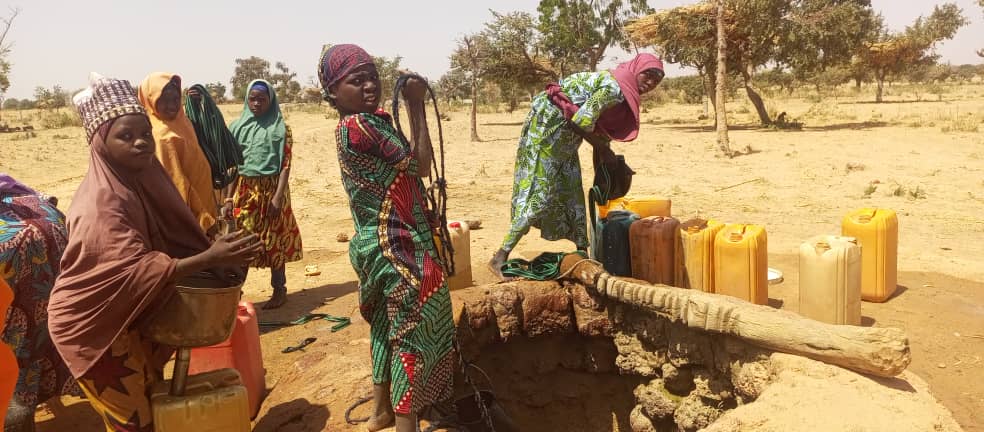It is that time of year in Bauchi State, Nigeria, when farmers are busy harvesting cassava tubers, a vital crop in the region.
In areas like Yalwan Duguri, Duguri, Pali, and Gwana in the Alkaleri Local Government Area, farmers are engaged in activities such as peeling, drying, and packaging their harvested cassava. They are also working hard to transport these tubers for processing, storage, and sale.
During a recent visit to the state, PREMIUM TIMES observed how farmers take advantage of the sunlight typical in northern Nigeria to help preserve their cassava. The freshly harvested tubers are peeled, dried, and then bagged.
 Cassava tubers dried on the ground
Cassava tubers dried on the groundAlong the fertile land in these areas, piles of bagged cassava are strategically placed by farmers close to their fields. Even though northern Nigeria often experiences long dry seasons every year, small-scale farmers are eagerly heading to the markets to sell their products.
 Piles of desiccated cassava tubers prepared for shipment
Piles of desiccated cassava tubers prepared for shipmentUnlike farmers in the southern parts of Nigeria, where cassava is primarily grown to make staple foods like gari (toasted granules), fufu (fermented tubers), and cassava flour (àmàlà láfún) used in various dishes, in Bauchi State and northern Nigeria, farmers typically grow and sell their cassava in its dried form.
This is because cereals (maize, sorghum, millet, etc) constitute the highest group of foods produced and consumed in the northern parts of the country while roots and tubers–cassava, cocoyam, yam etc– constitute the highest group of staple foods consumed in the south and central zones.
 Trailer loading dried and packaged cassava tubers (PHOTO CREDIT: Abdulkareem Mojeed)
Trailer loading dried and packaged cassava tubers (PHOTO CREDIT: Abdulkareem Mojeed)It was gathered that many farmers in Bauchi State perceive cassava farming as “Bauchi’s Green Gold”, and as such they leverage its potential to boost their livelihood amidst inflationary pressures and climate change effects.
Nigerians need credible journalism. Help us report it.
Support journalism driven by facts, created by Nigerians for Nigerians. Our thorough, researched reporting relies on the support of readers like you.
Help us maintain free and accessible news for all with a small donation.
Every contribution guarantees that we can keep delivering important stories —no paywalls, just quality journalism.
Insert picture showing farmers holding dried-peeled cassava tubers
Some of the farmers who spoke with PREMIUM TIMES hinted that a bag of the packaged cassava is currently being sold within the range of N18,000- N20,000, as against N20,000- N25,000 it was sold for within the same period last year.
 Sacks of dried cassava tubers (PHOTO CREDIT: Abdulkareem Mojeed)
Sacks of dried cassava tubers (PHOTO CREDIT: Abdulkareem Mojeed)“Some of the farmers who are not desperately in need of money will harvest, dry, package and store their cassava until when the price is high, so they can make more money,” a resident, who identified as Sulaiman, told our reporter.
According to the United Nations Food and Agriculture Organisation(FAO), an average Nigerian meets about 95 per cent of the minimum energy requirements mainly from cereals and roots and tubers, followed by grain legumes.
Cassava production in Nigeria
Botanically referred to as Manihot esculenta, cassava is a perennial woody shrub with an edible root. It grows in tropical and subtropical areas of the world.
According to the International Institute for Tropical Agriculture (IITA), cassava originated from tropical America and was first introduced into Africa in the Congo basin by the Portuguese around 1558. Today, cassava supports the livelihood of over 300 million Africans, as it is rich in carbohydrates, calcium, vitamins B and C, and essential minerals.
However, nutrient composition differs according to variety and age of the harvested crop, and soil conditions, climate, and other environmental factors during cultivation.
Globally, Nigeria is the world’s largest producer of cassava, and the crop is grown in at least 24 of the country’s 36 states. The main cassava-producing states in Nigeria are Benue, Kogi, Cross River, Akwa Ibom, Rivers, Delta, Ogun, Ondo, Oyo, Enugu, and Imo.
READ ALSO: Agric In Nigeria (January Edition): Nigerian farmers count gains, pains
According to IITA, in 2017, Nigeria produced 59 million tons, approximately 20 per cent of global production, with a 37 per cent increase in the last decade. In 2021, over 63 million tons of cassava was produced in the country.
Despite this, Nigeria’s cassava value chain has not achieved its full potential, as supply is yet to meet its huge demand, and the country has not fully leveraged on the global market for cassava and its derivatives due to infrastructural and technological deficit
More pictures below
 Bauchi farmers displaying dried cassava tubers (PHOTO CREDIT: Abdulkareem Mojeed)
Bauchi farmers displaying dried cassava tubers (PHOTO CREDIT: Abdulkareem Mojeed) Sacks of dried cassava tubers (PHOTO CREDIT: Abdulkareem Mojeed)
Sacks of dried cassava tubers (PHOTO CREDIT: Abdulkareem Mojeed)
Support PREMIUM TIMES' journalism of integrity and credibility
At Premium Times, we firmly believe in the importance of high-quality journalism. Recognizing that not everyone can afford costly news subscriptions, we are dedicated to delivering meticulously researched, fact-checked news that remains freely accessible to all.
Whether you turn to Premium Times for daily updates, in-depth investigations into pressing national issues, or entertaining trending stories, we value your readership.
It’s essential to acknowledge that news production incurs expenses, and we take pride in never placing our stories behind a prohibitive paywall.
Would you consider supporting us with a modest contribution on a monthly basis to help maintain our commitment to free, accessible news?
TEXT AD: Call Willie - +2348098788999




 2 weeks ago
18
2 weeks ago
18









 English (US) ·
English (US) ·